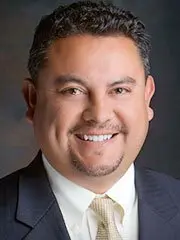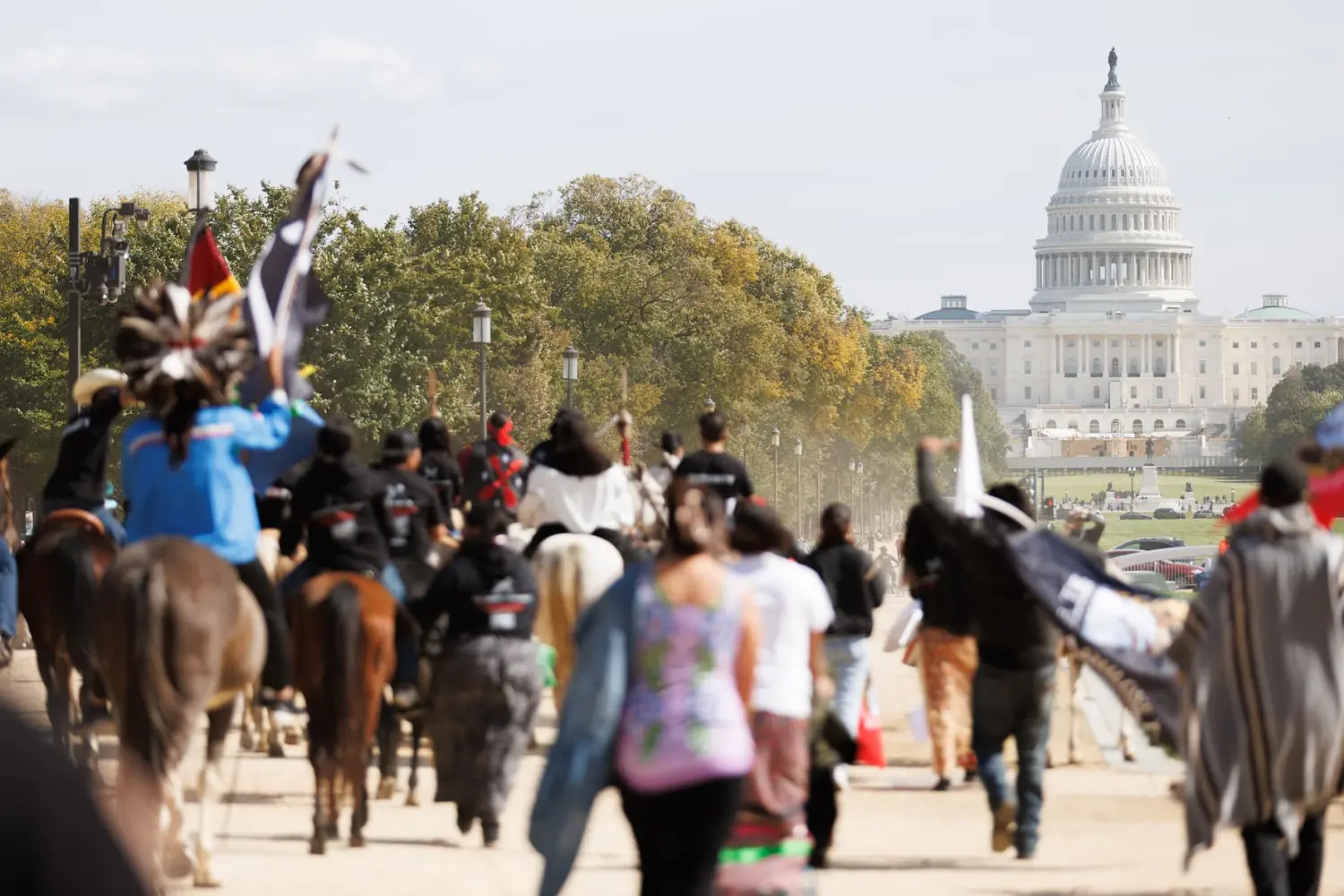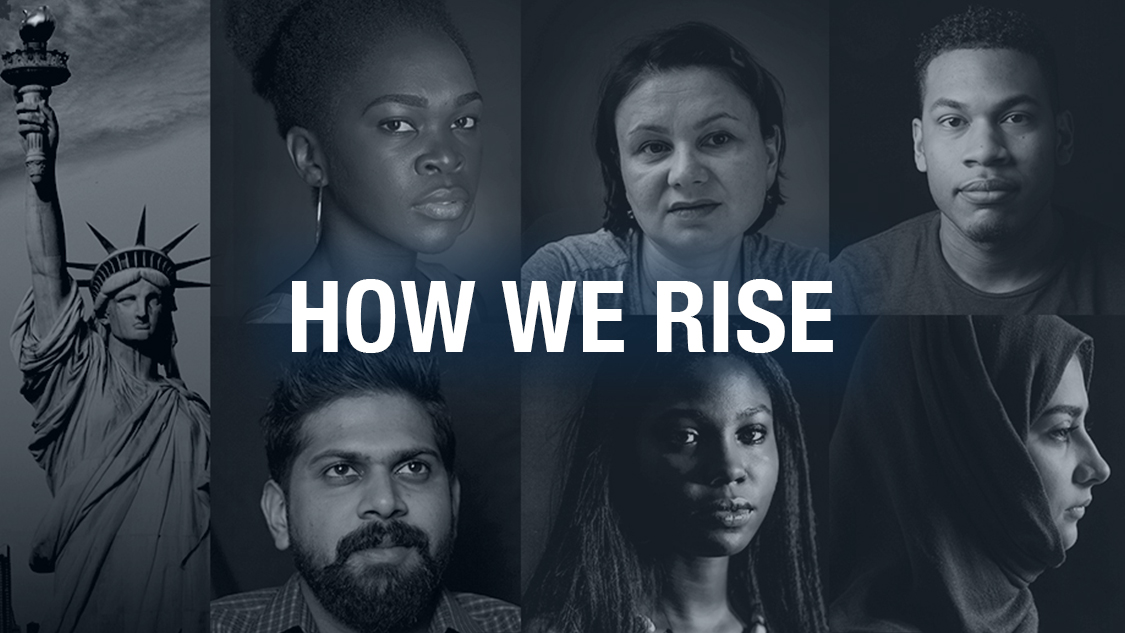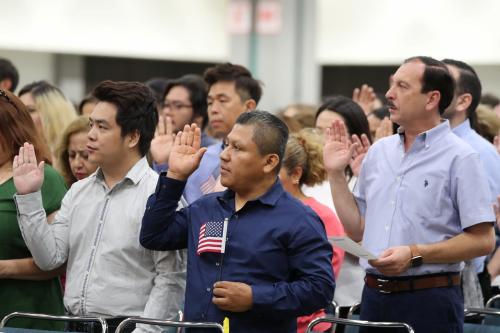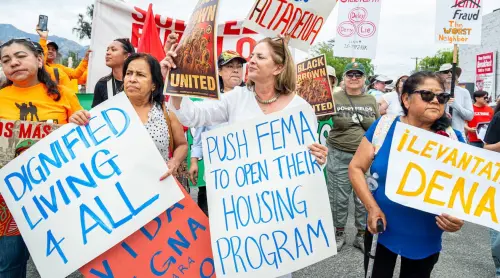The 2024 American Electorate Voter Poll, conducted by the African American Research Collaborative (AARC) and BSP Research, has a nationally representative sample of Native American voters (n=500) that ensures Native American voters’ voices are included in the discussion of this historic election. This oversample was supported by First Nations Development Institute and is designed to be representative of the Native American electorate. This post summarizes the main findings from the poll regarding Native American voters.
Native American voters continued to be consequential across the presidential election and several other races this cycle. Both presidential candidates targeted Native American voters in crucial battleground states, including Arizona, North Carolina, Michigan, and Nevada.
Despite the continued importance of the Native American vote, Native American voters remained largely absent in preelection discussions by election experts and pundits due to nearly no credible data available about this electorate. Furthermore, the available data on Native American voters was often flawed, leading to dangerous conclusions about the Native American vote. This includes the National Exit Poll conducted by Edison Research, which suggested that 65% percent of Native Americans voted for Republican candidates based on a small and non-representative sample of Native American voters that did not include interviewing locations on any tribal lands across the country.
The national media’s heavy reliance on this questionable poll is misleading, as its depiction of support for Trump among Native Americans deviates from past patterns and has drawn significant criticism from tribal communities nationwide.
This poll provides a fresh perspective to the discussion of Native American voters in the 2024 election. The 2024 American Electorate Voter Poll addresses the challenge of inaccurate data on Native American voters by including a nationally representative sample of Native American voters within a broader national voter sample. This enables comparisons of their voting behavior with that of other racial and ethnic groups. Similar to other surveys, AARC and BSP Research have conducted surveys among Native Americans nationally, and the survey relies on a self-identified/opt-in sampling design.
However, the survey took important steps to ensure that the data was representative of Native American voters. This included screening out potential respondents whose connection to their Native American ancestry was only through a distant relative, ensuring that the study was not limited to Native Americans who live in urban areas, and incorporating respondents who have some connection to their tribe’s native language. In fact, 21% of self-identified Native American respondents in the sample reported that they live on a reservation/tribal lands and another 37% near a reservation/tribal lands. Native Americans who live on tribal lands face challenges accessing the ballot box that could impact how they view electoral politics and policies aimed at improving voting access. Similarly, 43% of respondents reported that they speak a Native American language in their home. This is another critical consideration when designing survey samples, as language plays a key role in shaping ethnic identity and community connections, and language rights are safeguarded by the Voting Rights Act.
The poll’s researchers believe strongly that pollsters should take similar steps to collect and report out important demographics for Native American respondents as this leads to more reliable and representative data. Consequently, this summary of the national Native American voting data provides a much more balanced discussion of how and why Native American voters participated in the 2024 election.
Native American voters favored Harris and Democrats over Trump and Republicans
As reflected in the figure below, 57% of Native American voters supported Vice President Harris in the presidential race in 2024, compared to 39% who supported President-elect Trump. Another 4% of respondents cast their ballot for another candidate. Results from the survey across all racial groups indicate that Native American voters were more likely to vote for Trump than Black, Asian American, or Latino voters. However, they were +17% more likely to vote for Harris than white voters.
One of the major themes of the post-election analysis has been the apparent improvement for Trump and Republicans among men of color. As reflected in the figure below, there was a significant gender difference among Native American voters in 2024, with a 13% difference between Native American men and women—63% of Native American women reported voting for Harris compared to 50% of Native American men. This indicates that Democrats should include Native American men in their post-election discussions on strategies to strengthen their support among all men of color, including Native American men. There was also a small difference in voting behavior based on age. Native American voters under the age of 40 were more likely to vote for Vice President Harris than those over the age of 40.
Incorporating demographic questions specific to tribal communities is crucial for understanding Native American voting patterns and policy discussions. There is a notable difference in voting behavior among Native Americans based on their connection to their tribe’s Native language. Among respondents who speak a Native language at home, 63% reported voting for Harris, compared to 52% of those who do not speak a Native language at home.
Native American voters were also more likely to vote for a Democrat in their congressional races across the country, with 57% indicating they voted for a Democrat compared to 38% who cast their ballot for a Republican congressional candidate. This is slightly higher than in 2022, when 56% of Native Americans reported that they voted for a Democrat compared to 40% who voted for Republican candidates, according to the AARC/BSP Research 2022 Election Eve Poll.
The policy agenda of the Native American electorate
The Election Poll included two policy questions that were asked only of Native American respondents. This included if respondents consider tribal issues when voting. Nearly eight in 10 (78%) Native American respondents said that they did consider tribal issues when they voted in the 2024 national election. Native American respondents who live on or near a reservation were 10% more likely to report that they considered tribal issues when they voted compared to those who do not live on or near a reservation—82% to 72%.
Respondents who said that they do consider tribal issues when they vote were asked to identify the issues that were most important to them when they voted. As reflected in the figure below, tribal sovereignty/right to govern and land rights are the most salient tribal issues that influenced Native Americans voting behavior in 2024 at 58% and 59% respectively. These were followed by preserving culture and language, highlighted by 49% of respondents. Economic development ranked next at 40%, with the preservation of Native American history identified by 31%. Environmental concerns rounded out the top priorities at 30%.
The poll also included several items on climate change and energy policy. Native Americans are supportive of expanding the nation’s investment in clean energy, as well as protecting families against the negative impacts of climate change:
- Eighty-nine percent support providing more resources to protect families against the impacts of climate change and to prepare for and recover from future hurricanes, wildfires, extreme heat, and other climate disasters.
- Eighty-eight percent support expanding clean energy investments to create more manufacturing jobs in the U.S.
- Eighty-seven percent support expanding clean energy investments to lower electricity bills and energy costs.
Respondents were also asked to identify the most important issues that they want Congress and the president to address. The state of the economy, including jobs and inflation, were top concerns for Native American voters, which was similar to the electorate overall, and Native Americans support policy reforms that will address these concerns. One of the leading federal policy priorities for Native American voters was the cost of living and inflation, with 55% selecting it as one of their top three concerns for Congress and the president to address. Additionally, 88% of Native Americans expressed strong support for “a law or regulation that bans price gouging and prevents corporations from artificially raising prices.”
Jobs and the broader economy ranked as the second most frequently identified policy priority among Native Americans, cited by 31%. Housing costs and affordability followed closely at 29%. Additionally, 76% of Native Americans in the poll expressed support for a proposal to build three million new homes and provide $25,000 in down payment assistance to improve access to affordable housing.
The fourth priority among Native American voters was abortion/reproductive rights, an issue that was also a top priority for this subgroup in 2022 (24%). This issue was especially significant for Native American women, with 30% naming it a top policy priority compared to 17% of Native American men. Just under 80% of Native Americans in the poll support “a federal law to guarantee access to abortion and give women control over their own private medical decisions.” Rounding out the top five priorities, 20% of respondents highlighted the cost of health care as a key concern. On this issue, 94% of Native Americans support “allowing Medicare to negotiate lower prices on prescription drugs” to help address the rising costs of health care.
Mobilization and outreach to Native Americans in 2024
Native Americans continue to encounter significant obstacles when exercising their right to vote. According to a recent Brennan Center report, many Native Americans live far from the nearest polling location and often lack a physical address, a requirement in some states to cast a ballot. These barriers have contributed to lower voter turnout among Native Americans in recent elections. However, the poll reveals strong support for election reform to address these issues, with 87% of Native Americans favoring the passage of a new Voting Rights Act to eliminate barriers and ensure all eligible citizens can vote.
Both the Democratic and Republican candidates in the 2024 U.S. presidential election made symbolic efforts to engage Native American voters. The Harris-Waltz campaign invested heavily in outreach, launching a $370 million ad campaign between Labor Day and Election Day that focused on key Native issues such as treaty rights and tribal sovereignty. Beyond media efforts, the campaign prioritized direct engagement, including meetings with tribal leaders and rallies held in Arizona’s Gila River Indian Community. This outreach was bolstered by President Biden’s federal apology for the U.S. government’s historical role in Native American boarding schools, delivered in the battleground state of Arizona.
In contrast, the Trump-Vance campaign concentrated on key swing states but placed less focus on direct outreach to Native American communities. The campaign received support from U.S. Senator Markwayne Mullin, a member of the Cherokee Nation, who emphasized Trump’s commitment to granting federal recognition to the Lumbee Tribe—a longstanding issue for the tribe. This promise resonated with some Native American voters, particularly in the battleground state of North Carolina.
Despite these outreach efforts, when asked if anyone from a political party, campaign, or any other organization contacted them to ask them to register and/or vote in this election, 50% of Native American voters indicated that they had not been contacted by anyone in 2024. These survey results reveal that both parties can improve their outreach to tribal communities to improve contact rates for Native Americans.
However, among those who were contacted, Native Americans were more likely to be contacted by Democrats rather than Republicans (31% to 21%). Another 10% of Native Americans reported that they were contacted by someone from a nonpartisan, civic, or other organization, and 9% reported being contacted by someone representing a ballot initiative or referendum.
Conclusions
The 2024 Election Eve Poll reveals that a significant majority of Native Americans continue to lean Democratic in their voting preferences. However, both major political parties have opportunities to strengthen their appeal to this critical subgroup of the national electorate, which can significantly influence election outcomes both nationally and in key states. While Native Americans share many of the same voting motivations as the broader electorate—such as concerns about inflation, jobs, health care costs, abortion, and reproductive rights—they also represent a unique and multifaceted electorate with distinct tribal-specific priorities.
The poll reveals that many Native American voters across the country prioritize issues specific to tribal communities when casting their ballots. Key concerns include tribal sovereignty, land rights, and the preservation of Native American culture, language, and history—issues that received inadequate attention from political campaigns during this election cycle. This survey sheds light on the nuanced policy attitudes and voting behaviors of the Native American electorate, a group often mischaracterized in mainstream polling. Although the poll relies on self-identified Native Americans, it incorporates measures to ensure respondents have meaningful connections to their Native ancestry, offering a more accurate depiction of Native American voter participation in the 2024 election. First Nations, AARC, and BSP Research recommend that pollsters adopt similar measures to those used in this poll and collaborate with tribal communities to enhance the relevance and accuracy of their research.
-
Acknowledgements and disclosures
The survey data referenced herein was produced independently by a third-party firm, BSP Research on behalf of the organizations who funded the election survey. Outside of his work at Brookings, Dr. Gabriel Sanchez serves as Director of Research for BSP Research which designed and implemented this survey. Sanchez had no role in the design or implementation of this survey.
The Brookings Institution is committed to quality, independence, and impact.
We are supported by a diverse array of funders. In line with our values and policies, each Brookings publication represents the sole views of its author(s).
